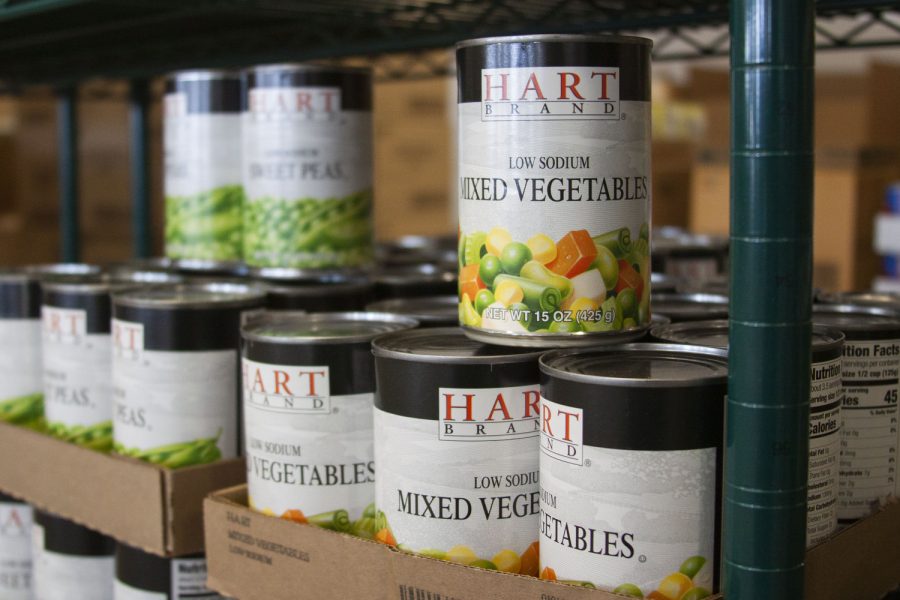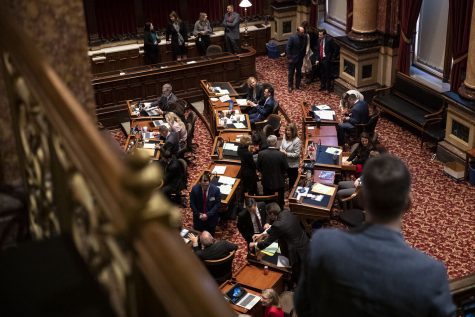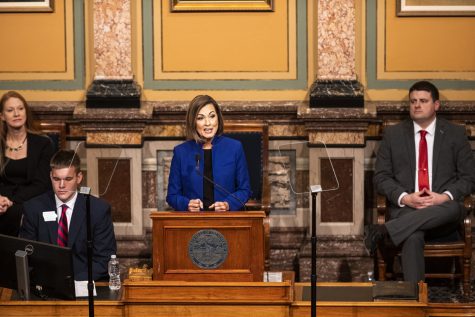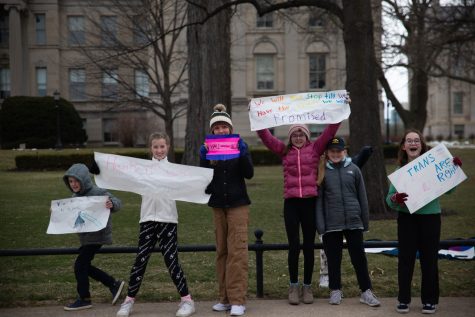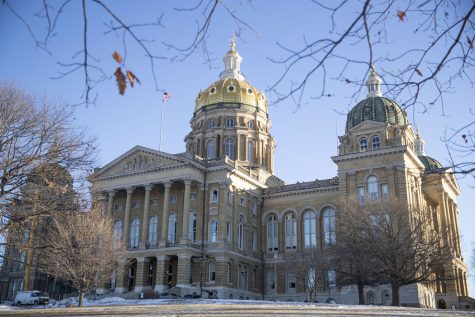Iowa House passes bill requiring asset tests, increasing oversight on public assistance programs
Iowa House Republicans passed a bill that would bar those with more than $15,000 in cash assets from receiving public assistance. Democrats argue that this would discourage saving for emergencies and investing in exiting poverty.
Food donations are seen inside of the CommUnity Crisis Services and Food Bank in Iowa City on Feb. 14, 2022. The center is a volunteer-driven organization for grocery assistance.
April 13, 2023
A bill that would create more barriers for Iowa families looking to receive public assistance is headed to the governor’s desk after passing a 58-41 vote in the Iowa House on Thursday. Five Republicans joined all Democrats in opposing the bill.
Senate File 494 would create asset tests for state-administered public assistance programs like food assistance, Medicaid, and family investment programs. The bill also requires the Iowa Department of Health and Human Services to hire 218 full-time employees for the administration of the program.
Rep. Joel Fry, R-Osceola, argued that the bill legislated standing practices from the Iowa Department of Health and Human Services and current federal law regarding public assistance program administration.
Fry said the asset tests comply with current federal guidelines on food assistance eligibility.
The bill would implement a cap of $15,000 in liquid assets to maintain eligibility for food assistance programs. However, the asset total would not include the total fair market value for one car per household and up to $10,000 of fair market value for a second car per household, additionally, homeownership would not be included in the asset total.
“I believe this keeps everybody at the table: it keeps those in need, taxpayers, and balances the needs for all,” Fry said during closing remarks on the bill on Thursday evening. “Might I also add one more time that federal tax dollars — state tax dollars — all come from the taxpayers’ pocket. House Republicans believe maintaining the safety net is critical for all Iowans — for those who receive, as well as, those who give.”
Republicans also argued the bill would reduce fraud and ensure only those that are eligible receive benefits. However, the Iowa Department of Health and Human Services only referred less than 1 percent of recipients to be investigated by the Iowa Department of Inspections and Appeals for fraud.
The bill would save the state about $8 million per year after the implementation of $6 million in added costs from the hiring of hundreds of full-time employees to implement the immense oversight requirements of the bill.
However, the state would lose almost $40 million in federal funding for assistance programs due to an estimated 1 percent reduction in qualified participants or approximately 8,000 Medicaid recipients, 600 CHIP recipients, 100 FIP recipients, and 2,800 SNAP recipients.
Federal food assistance programs like the Supplemental Nutrition Assistance Program are funded almost entirely through the federal government. The state only shares half of the administrative costs for the program.
Democrats argued that the bill would further childhood poverty and hunger in Iowa by making it more difficult for families to access assistance programs.
Rep. Monica Kurth, a Democrat from Davenport, said the bill is going to further child hunger in the state by placing more pressure on food pantries and private aid organizations in the state.
“There’s no reason to do this,” Kurth said. “This bill is mean. It is a continuation of the myth. That the people on these programs are cheats and are gaming the system — this is not true — and is one more way that this body has blamed the victim by passing bad legislation.”
Rep. Elinor Levin, a Democrat from Iowa City, said the bill is discouraging saving and emphasized the need for emergency funds that the bill doesn’t allow for.
“I am particularly angered by one thing — the narrative that passing this bill is in any way a fiscally responsible decision,” Levin said. “Not only is it going to cost Iowa the federal benefits we deserve and require the state to spend to hire 200 new employees, as my colleagues have discussed, but it is also imposing a new level of fiscal irresponsibility upon the people of Iowa. This is particularly important to me because one of the issues I discussed in my campaign was the ability of folks in Iowa to be banked, to have a financial safety net, and to avoid catastrophic loss in their life due to an unforeseen expense.”
The bill would also require that recipients of Medicaid must comply with child support services to be eligible.



